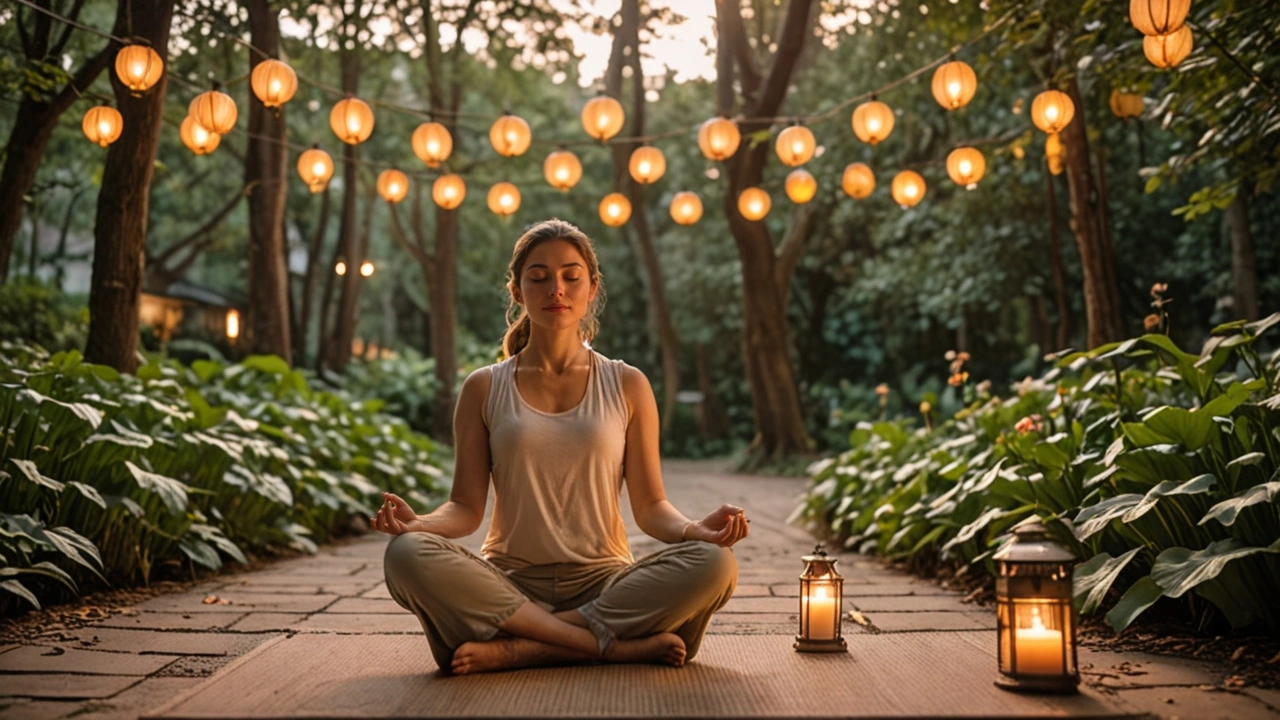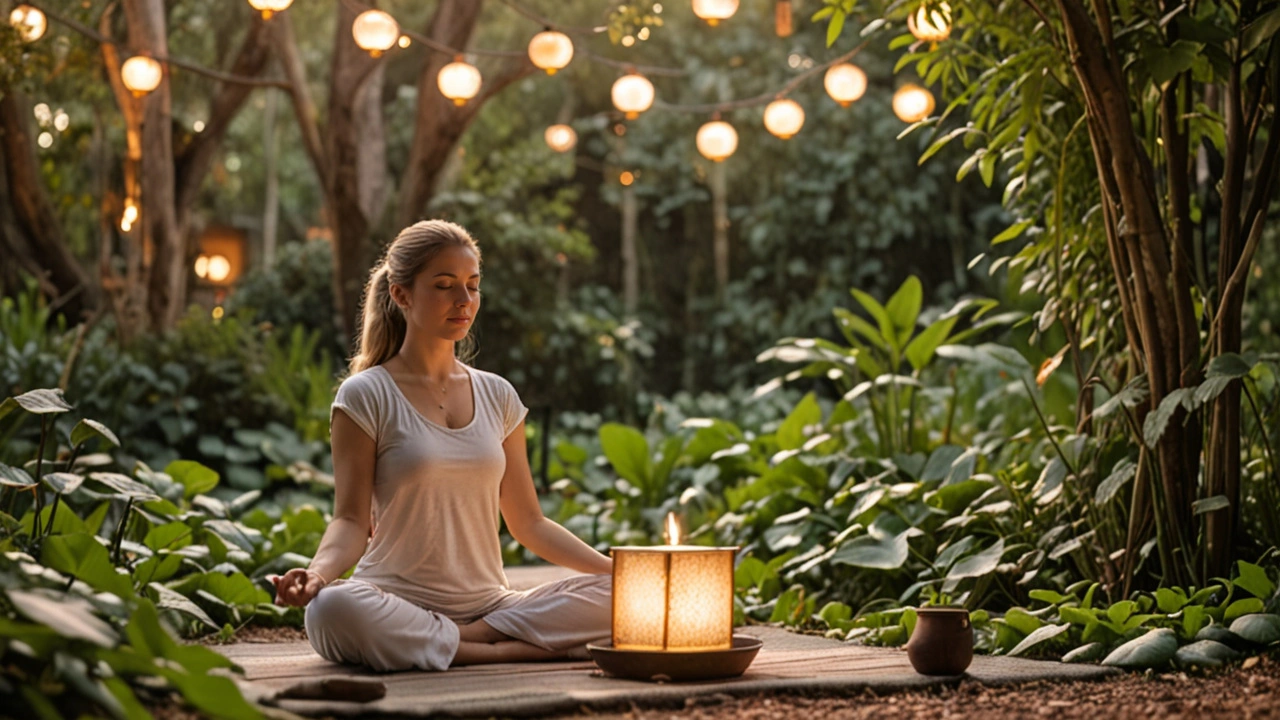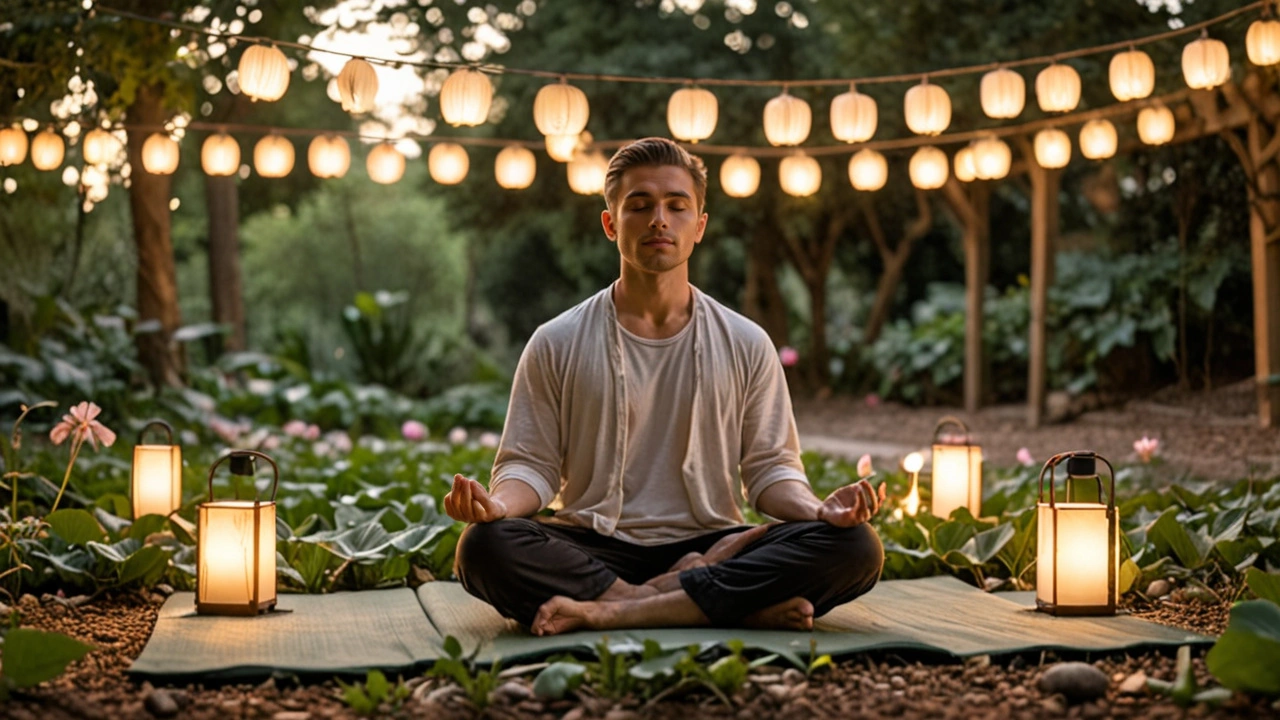In today's fast-paced world, finding inner peace can often seem like a daunting task. Yet, the ancient practice of meditation offers a pathway to a calmer and more centered life. By dedicating just a few moments each day to meditation, individuals can experience profound changes in their mental and emotional well-being.
Meditation isn't just about sitting silently; it's a practice that cultivates mindfulness, helps reduce stress, and enhances one's overall sense of calm. Delving into meditation can provide the tools needed to navigate life's challenges with grace and composure.
This article will guide you through the basics of meditation, delve into its numerous benefits, examine the intrinsic link between calmness and meditation, and offer practical steps and tips to seamlessly integrate these practices into your everyday routine. Get ready to embark on a journey towards a calmer, more peaceful you.
- Introduction to Meditation
- Benefits of Meditation
- The Connection Between Calmness and Meditation
- Simple Steps to Start Meditating
- Practical Tips for Daily Calmness
- Personal Experiences and Testimonials
Introduction to Meditation
Meditation is often perceived as a complex or mystical practice reserved for monks or spiritual gurus. However, at its core, meditation is simply the act of training the mind to focus and redirect thoughts. This ancient practice, which dates back thousands of years, is used internationally as a way to foster mental clarity, emotional calmness, and physical relaxation.
People meditate for various reasons, whether it’s to achieve a state of calm, reduce anxiety, or improve concentration. One of the accessible and widely practiced forms of meditation is mindfulness meditation. This technique encourages individuals to pay full attention to the present moment without judgment. When thoughts stray, and they inevitably will, the aim is to gently guide them back without frustration. It's an approachable way to train the mind and can be practiced anywhere, at any time.
Delving deeper into the history, meditation's roots are anchored in various spiritual and religious traditions. Buddhism, for example, introduces meditation as a path towards enlightenment. Hinduism, on the other hand, integrates it into daily rituals as a form of self-discipline. Despite these spiritual origins, modern meditation practices transcend religious boundaries, appealing to a broader audience focused on wellness and mental health.
Scientific research has lent credibility to what ancient practitioners have long believed. Studies indicate that consistent meditation can lead to structural changes in the brain, particularly in areas related to attention and emotional regulation. For instance, MRI scans reveal increased gray matter density in the hippocampus, which plays a key role in learning and memory, among regular meditators. Additionally, the amygdala, associated with stress and anxiety, tends to shrink.
“Meditation can help us connect with our inner strength and resilience,” says Jon Kabat-Zinn, a renowned mindfulness teacher and author. “It’s about finding and cultivating your best self.”
The beauty of meditation is its simplicity and the limited resources required to begin. All one needs is a quiet space and a few minutes of dedicated time. As it involves deep and focused breathing, it's free and requires no special equipment. This makes it an accessible practice for anyone, irrespective of age, background, or lifestyle.
If you're uncertain about starting this journey on your own, many resources are available, from guided meditation apps to community classes. Engaging with a community can offer support and enhance your practice. For beginners, platforms like Headspace and Calm provide step-by-step instructions and a variety of meditation styles to explore. Whether you're seeking peace, clarity, or a break from the chaos, meditation offers a plethora of benefits, making it a worthy addition to your daily routine.
Benefits of Meditation
Meditation has been practiced for thousands of years, but its benefits are more relevant today than ever before. By taking a few minutes each day to meditate, people can tap into a world of mental, emotional, and physical benefits. One of the most acclaimed advantages is stress reduction. Studies have shown that meditation can significantly reduce levels of cortisol, the hormone responsible for stress. When cortisol levels are managed, it leads to a ripple effect of improved mood and overall well-being.
Another significant benefit of meditation is the enhancement of mental clarity and focus. Regular meditation practice can train the brain to stay present, improving concentration and memory. This is particularly beneficial in our multitasking world where distractions are everywhere. Researchers have found that people who meditate regularly have increased gray matter in the brain regions associated with learning and memory.
As renowned meditation teacher Jon Kabat-Zinn once said, "Meditation is not about stopping thoughts, but recognizing that we are more than our thoughts and emotions." This perspective helps individuals gain a different outlook on their mental processes, promoting a feeling of mindfulness and self-awareness.
Beyond mental clarity, meditation also offers emotional benefits. It helps cultivate a greater sense of compassion and empathy, both towards oneself and others. This can be particularly transformative in relationships, leading to healthier and more meaningful connections. When people are more patient and understanding, they can navigate conflicts with greater ease and less emotional turmoil.
From a physical standpoint, meditation can also offer tangible health benefits. Regular practice has been linked to lower blood pressure, improved heart health, and even a stronger immune system. By promoting relaxation responses in the body, meditation helps reduce chronic pain and improve sleep quality. It's a holistic approach to health that benefits the body as much as the mind.
Incorporating meditation into one's daily routine can also lead to increased resilience and adaptability. Life is unpredictable, and stressors can come from every direction. With a stable meditation practice, individuals can develop a stronger inner foundation to handle life's challenges with grace and flexibility. This resilience is a crucial trait for mental health, helping people bounce back from adversity more quickly.
Another powerful aspect of meditation is its ability to enhance creativity. By calming the mind and focusing inward, individuals often find that they can think more freely and tap into new ideas and insights. This is why many artists, writers, and innovators use meditation as a tool to unleash their creative potential.
Finally, meditation fosters a deeper connection with oneself. It encourages a journey of self-discovery, helping people understand their true nature and purpose. This self-awareness can lead to a more fulfilling life, as individuals align their actions and choices with their core values and desires. It's no wonder so many people are turning to meditation as both a spiritual and practical tool for personal growth.

The Connection Between Calmness and Meditation
Understanding the connection between calmness and meditation begins with appreciating how these practices work hand-in-hand to improve mental well-being. Meditation, at its core, is a technique that fosters mindfulness, allowing the practitioner to focus on the present moment. This focus is essential in calming the mind, as it helps to reduce the incessant chatter and worries that often cause stress.
When you meditate, your brain shifts into patterns that are associated with relaxation. Scientists have found that during meditation, there's an increase in activity in the parasympathetic nervous system. This part of the nervous system is responsible for the body’s rest and digest functions, promoting a state of deep relaxation and calm. According to a study in the journal Psychiatry Research, practicing meditation can reduce the size of the amygdala, the brain region associated with stress and anxiety response.
Meditation also encourages the release of endorphins, the body's natural feel-good hormones. This hormonal change can result in a reduced perception of pain and stress, creating an overall sense of well-being. By consistently practicing meditation, individuals often find that their baseline level of calmness increases, making them better equipped to handle life's ups and downs.
Historical texts throughout various cultures have long touted meditation as the path to tranquility. The ancient writings of the Bhagavad Gita, for example, speak of finding inner peace through meditation and mental discipline. Such wisdom highlights that the practice of meditation has stood the test of time, constantly proving its effectiveness in fostering a peaceful state of mind.
According to Dr. Herbert Benson, a pioneer in mind-body medicine, “Meditation elicits the relaxation response, a state of profound rest that changes the physical and emotional responses to stress.” Through consistent practice, even just a few minutes each day, individuals can develop a heightened sense of calm that permeates into all areas of life.
Moreover, the embracing of calmness through meditation is reflected not only in individual experiences but also in statistics. For example, a 2018 study published in the journal Frontiers in Psychology revealed that participants who engaged in an eight-week mindfulness meditation program reported a 30% reduction in symptoms of anxiety, depression, and stress levels. Impressive, right?
Simplifying the concept, it can be noted that meditation teaches the mind to let go. It lets go of the past and the future and sits comfortably in the now. This practice of being present not only helps in mitigating stress but also in understanding and appreciating the world and oneself more clearly. Meditation establishes an inner sanctuary, a space one can return to whenever needed, cultivating calmness from within.
Cooking up calmness through meditation is like preparing a garden. You need to plant the right seeds of focus and attention, water them regularly with consistent practice, and weed out distractions and negative thoughts. Over time, a beautiful and serene mental landscape emerges, filled with the fruits of tranquility and inner peace. Ultimately, through meditation, calmness becomes not just an occasional state but a steady, unwavering backdrop to your daily life.
“Meditation is not about stopping thoughts, but recognizing that we are more than our thoughts and our feelings.” - Jon Kabat-Zinn, founder of Mindfulness-Based Stress Reduction.
Simple Steps to Start Meditating
Starting meditation might seem intimidating at first, but the truth is, everyone can do it. It's a practice that doesn't require any special equipment or a lot of time. Just a few minutes a day can make a significant difference. Begin by selecting a quiet space where you won't be disturbed. It could be a corner in your home, a spot in a park, or even a quiet room at work. The key is to find a place where you feel comfortable and safe.
The next step is to choose a comfortable sitting position. You can sit on a chair with your feet flat on the ground, sit cross-legged on a cushion, or even lie down if that feels better for you. What's important is to maintain a posture that is both relaxed and attentive. Keep your back straight but not rigid, allowing your body to relax naturally.
Close your eyes gently to avoid distractions and focus on your breath. Breathe in deeply through your nose, feeling the air fill your lungs and expand your diaphragm. Then, exhale slowly through your mouth, releasing all the tension. Focus on the rhythm of your breathing. If your mind starts to wander, gently bring it back to your breath. This process of refocusing your mind is a crucial part of meditation and helps to train your attention and concentration.
Start with just five minutes a day. As you become more comfortable with the process, gradually increase the duration of your sessions. Consistency is key, so try to meditate at the same time every day. Some people find it helpful to meditate in the morning to set a peaceful tone for the day, while others prefer to do it before bed to unwind and relax.
It can also be helpful to use a meditation app or guided meditation video. These resources can provide structure and direction, especially for beginners. Popular apps like Headspace and Calm offer a variety of guided meditations, ranging from relaxation to focus to sleep. Many of these apps also offer free trials or basic versions that can be a good starting point.
"Meditation is not about stopping thoughts, but recognizing that we are more than our thoughts and our feelings," says Deepak Chopra, a renowned advocate for meditation and mindfulness.
Remember, there is no right or wrong way to meditate. It's a personal practice that will evolve with time. Be patient with yourself and trust the process. The goal of meditation is not to achieve a particular state of mind but to simply be present and aware, accepting whatever feelings or thoughts come up without judgment.

Practical Tips for Daily Calmness
Incorporating calmness into your daily life doesn't have to be complex or time-consuming. With a few easy adjustments, you can create a routine that fosters tranquility and inner peace. One effective way is by beginning your day with a few minutes of meditation. Even spending just five to ten minutes focused on your breathing can set a calm tone for the rest of the day. This practice, performed consistently, helps to anchor your mind and reduce stress.
Another practical tip for daily calmness is to practice mindfulness throughout the day. This involves being fully present in whatever you're doing, whether it's eating, walking, or even washing dishes. When you focus on the present moment, you're less likely to get caught up in worries about the future or regrets about the past. A simple technique is mindful breathing—taking deep, slow breaths and paying attention to the sensations involved.
Regular physical exercise is also beneficial for maintaining calmness. Activities like yoga, tai chi, and even brisk walking can help to release built-up tension and promote relaxation. These exercises not only improve physical health but also support mental well-being by reducing anxiety and stabilizing mood.
Creating a peaceful environment at home can significantly impact your sense of calm. Consider decluttering your space, incorporating calming colors, and using soft lighting. Elements like houseplants can bring a touch of nature indoors, and studies have shown that they can improve mood and reduce stress. The Japanese practice of Shinrin-yoku, or forest bathing, highlights the calming effect of spending time in nature.
Listening to calming music or sounds can also be a quick way to instill calmness. Nature sounds, classical music, or soft instrumental tunes can help to soothe your mind and create a relaxing atmosphere. This can be particularly useful during stressful times or as a way to unwind before bed.
Developing a routine for adequate sleep is crucial as well. Poor sleep directly impacts your stress levels and overall mental health. Establish a bedtime routine that includes winding down activities like reading a book, taking a warm bath, or practicing gentle stretches. Aim to go to bed and wake up at the same time each day, even on weekends.
Last but not least, consider keeping a journal. Writing down your thoughts can be a therapeutic way to clear your mind and process your emotions. Journaling can also help you identify patterns in your stress and develop strategies to manage them. Every evening, jot down a few things you're grateful for, which can shift your focus away from stress and towards positivity.
"Calmness is the cradle of power." – Josiah Gilbert Holland
Remember, achieving daily calmness is an ongoing process that requires a combination of techniques and a commitment to making small, consistent changes. By incorporating these practical tips into your daily routine, you can cultivate a deeper sense of inner peace and resilience.
Personal Experiences and Testimonials
One of the most powerful validations of meditation's effectiveness comes from personal stories. Take Sandra, a corporate executive who found herself overwhelmed by her demanding job and struggling with anxiety. She turned to meditation as a desperate measure to cope. Sandra recalls how her initial attempts were filled with restlessness and impatience. But as she persisted, dedicating just 10 minutes each day to sit quietly, she began noticing subtle shifts in her mind and body. The anxiety that once tightly gripped her started loosening, and she found herself approaching stressful situations with a newfound calm.
Similarly, John, a college student, shared his journey of using meditation to combat the pressures of academia. He had always been skeptical, but a friend convinced him to give it a try. John chose guided meditations, which helped him stay focused. Over time, he noticed an improvement not only in his stress levels but also in his ability to concentrate and retain information. “It’s like my mind got a tune-up,” he said, jokingly.
There’s also a heartwarming story from Maria, a mother of two, who was battling postpartum depression. A support group introduced her to meditation, and with consistent practice, she experienced a significant uplift in her mood and energy levels. The practice didn’t just help her manage her emotions; it reconnected her with the joys of motherhood.
Even public figures like Oprah Winfrey and LeBron James have openly talked about incorporating meditation into their lives. Oprah credits her daily meditation routine for helping her maintain balance amidst her busy schedule.
“It’s like a reset button,” she says, “giving me clarity and calm to navigate through the chaos of life.”LeBron has shared how meditation aids his mental toughness, keeping him focused and resilient on and off the basketball court.
To quantify the impact, a 2018 study by the National Institutes of Health revealed that 14% of Americans had tried meditation at least once. This growing interest might be attributed to the increasing evidence supporting meditation's benefits on mental health. In another survey, 60% of participants reported a reduction in stress levels after practicing meditation regularly for six months.
These personal stories and statistics serve as powerful testimonies to the real-world impact of meditation. They illustrate how a simple practice can transform lives, helping people from all walks of life find inner peace and resilience. Each story reinforces the idea that anyone can benefit from meditation, regardless of their background or circumstances.

